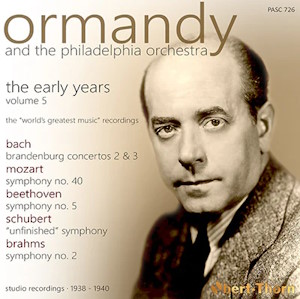
Eugene Ormandy (conductor)
Ormandy and the Philadelphia Orchestra – The Early Years Volume 5
rec. 1938/39, Academy of Music, Philadelphia
Pristine Audio PASC726 [2 CDs: 140]
This is the final volume in a series devoted to Ormandy’s ‘early years’ Philadelphia recordings and almost all the material was issued on the World’s Greatest Music in 1938-39. This was a budget-price label designed to produce fine quality recordings of standard repertoire that could undercut Columbia and RCA Victor though, ironically, they were all made and pressed by RCA Victor. The label was inaugurated by the Publishers Service Company which was, as Mark Obert-Thorn outlines in his producer’s note, the publishing arm of the New York Post newspaper. They were issued anonymously but featured such well-known conductors as Reiner, Rodziński and Ormandy himself and sold remarkably well. They must have been the way many Americans ‘learned’ the standard repertoire.
It’s been known for a number of years that smaller ensembles were used to save money – 49 players for Bach and Mozart and 74 for the remainder, though Ormandy, of course, always recorded in the Academy of Music, Philadelphia. Almost all sessions seem to have involved just two takes with three takes for problematic sides, and we know that session time was cut to a minimum. For example, the Bach Brandenburg Concertos and Mozart Symphony No.40 were allocated a three-hour session time and for Beethoven’s Fifth and Schubert’s Eighth only two hours ten minutes was allocated. The repertoire may well have been meat and drink to the orchestra but it still created ensemble tensions, especially with reduced forces with, presumably, different seating. There are some ensemble issues in the Bach Concertos as evidenced by an unprecedented four sides for the very first side No.2, of which take two was ultimately used. If they could get away with just the one take they did so. Ormandy’s Bach is mobile for the time and well thought-through, No.2 featuring the orchestra’s well-known soloists, Alexander Hilsberg, Saul Caston, William Kincaid and Marcel Tabuteau.
There’s nothing startling about any of the major works, interpretatively. Mozart’s 40th is beautifully phrased, features a number of portamentos throughout and is traditionally resonant without ever sounding complacent. There’s no repeat in the finale, presumably a money-saving operation, though Ormandy reverted to a full finale in his mid-50s recording. Beethoven’s Fifth sounds very similar to his mid-50s recording. Tempi are almost exactly the same, the conception already well in place. The difference is in sonority and weight and also in the superiority of the playing in the studio LP recording.
The only piece in this twofer to have seen prior reissue in any form is Brahms’ Second Symphony, recorded on 26 March 1939, as it was reissued on LP. Ormandy re-recorded it for Victor a few months later with hardly any interpretative differences but it had a richer and more sonorous sound. In 1953, when he returned to it, his conception had tightened somewhat and the first movement and Scherzo were tauter. What this 1939 recording might lack in tonal breadth, it makes up for in clarity. Schubert’s ‘Unfinished’ Symphony is excellent and ensemble is largely unproblematic even given the unforgiving recording schedule. If it’s not quite in the Bruno Walter league – ironically recorded with the same orchestra – or Beecham with the LPO it’s a more-than-acceptable offering for a mass market audience.
There is one addition, a Victor recording of Charles O’Donnell’s arrangement of Bach’s ‘Herzliebster Jesu’ from the St Matthew Passion which had escaped previous volumes in this series.
As ever, the transfers are excellent. This has been an attractive series which has filled gaps and explored discographic vistas, some of which have been previously untouched since the late 30s.
Jonathan Woolf
Availability: Pristine Classical
Contents
Johann Sebastian Bach (1685-1750)
St Matthew Passion: ‘Herzliebster Jesu’ BWV 244 (1727) arr. O’Connell
Brandenburg Concerto No.2 in F major, BWV1047 (1713-21)
Brandenburg Concerto No.3 in G major, BWV1048 (1713-21)
Wolfgang Amadeus Mozart (1756-1791)
Symphony No.40 in G minor, K550 (1788)
Ludwig van Beethoven (1770-1827)
Symphony No.5 in C minor, Op.67 (1808)
Franz Schubert (1798-1827)
Symphony No.8 in B minor, D759 ‘Unfinished’ (1822)
Johannes Brahms (1833-1897)
Symphony No.2 in D major, Op.73 (1877)


















